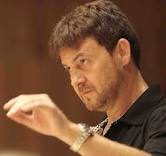James Levine to Return to Conducting at the Metropolitan Opera
James Levine to Return to Conducting at the Metropolitan Opera
Music Director’s initial performance will be with the MET Orchestra at Carnegie Hall on May 19; next season he will conduct three operas at the Met
New York, NY (October 11, 2012) – James Levine, the Metropolitan Opera’s Music Director, will return to conducting on May 19, 2013 with the MET Orchestra at Carnegie Hall. He will then lead three operas in the Met’s 2013-14 season, including a new production of Verdi’s Falstaff and revivals of Mozart’s Così fan tutte and Berg’s Wozzeck. He will also conduct all three Carnegie Hall concerts that season.
In recent weeks Levine, who is still recovering from a spinal injury due to a fall in August 2011, has already resumed some of his duties as the Met’s Music Director, coaching members of the Met’s Lindemann Young Artist Development Program, holding artistic planning sessions, and meeting with the Met’s Orchestra and Chorus.
Peter Gelb, the Met’s General Manager, made the announcement of Levine’s return on Thursday. Levine said, “I’m feeling better with each passing day and look forward to returning to the company I love so much. It has been a long healing process, but with a team of excellent doctors and the unwavering support of my friends and colleagues, I’m looking forward more than I can say to getting back to work.”
Gelb said, “Jim’s return to conducting is the welcome news that our company has long been waiting for, and it is also great news for opera lovers throughout the world.”
Levine has been in long-term rehabilitation since his fall and injury in August 2011, which required surgery and left him partially paralyzed. Based upon recent examinations, his team of physicians has expressed uniform optimism about his ability to resume conducting.
Dr. Len Horovitz, Attending Physician at Lenox Hill Hospital and Levine’s personal physician who coordinates his medical team, said, “James Levine is an inspirational case, whose return to conducting will be a result of remarkable perseverance and hard work.”
His neurosurgeon, Patrick O’Leary, Associate Attending Spine Surgeon at the Hospital for Special Surgery and former Chief of the Hospital’s Spine Service, who performed the recent operations on Levine’s spine, said that he was making a dramatic recovery. “He is no longer in need of additional surgery, his upper body strength is remarkable, and his prognosis is good.”
His neurologist, Edward Reich, Senior Attending Neurologist at Lenox Hill Hospital, said, “Neurologically, he is fit to return to conducting. With his intensive rehabilitation, his upper body strength is greater than it has been in years.”
While his upper body strength has returned and he is progressing with his rehabilitation, the injuries have left him temporarily unable to walk. For the time being, he will conduct from a motorized wheelchair, which he also uses to move about. In anticipation of his return, the Met’s technical department is designing customized, elevating podiums that will be utilized on the Carnegie Hall stage and in the Met’s orchestra pit.
Prior to his fall in 2011, Levine had undergone other surgeries to correct problems with his upper and lower spine, including stenosis, and fractured and herniated discs, which had caused severe and debilitating pain. This pain from his back injuries also aggravated a long-standing neurological disorder that is related to Parkinson’s disease – but is considered relatively benign because it does not progress. The condition was previously not disclosed by Levine for reasons of privacy. The medication for this benign form of Parkinsonism, as it is known, was treated with the Parkinson medication, L-dopa, a powerful medication that also contributed to the shaking in his legs and left hand.
Dr. Stanley Fahn, the H. Houston Merritt Professor of Neurology at Columbia University, has been treating Levine for the disease in recent years. He said, “Since 1994, Maestro Levine has shown symptoms of Parkinson disease. They mainly affected his legs and also caused a mild tremor in his left hand. Fortunately, the symptoms have changed little over the years and have been suppressed with medication. This lack of progression indicates a benign form of Parkinson’s, rather than the more typical form, in which symptoms steadily worsen. In the past, Maestro Levine’s symptoms were aggravated by the stress of severe back pain. Now that he is pain-free, his mild Parkinsonism should have little impact on his quality of life and his return to conducting. His upper body strength and dexterity are quite remarkable.”
News of Levine’s return was announced to the Executive Committee of the Met’s Board in a meeting on Thursday afternoon. The 1600 members of the Company were informed by Gelb in an announcement that evening.
While Levine is resuming his duties as Music Director, Fabio Luisi is also continuing in his role as Principal Conductor. “The Met is extremely fortunate to have Fabio’s strong presence in the pit,” said Gelb. “The orchestra and chorus admire him greatly and both Jim and I are very grateful for all that he brings to the Met with his artistry and continuing presence.”
The Met’s Music Director since 1976, Levine made his debut with the company in 1971 and has conducted 2,441 performances there, more than anyone in the company’s 129-year history. His 40th anniversary with the company was celebrated in the spring of 2011. The most recent performance he conducted at the Met was of Wagner’s Die Walküre on May 14, 2011, a matinee which was transmitted worldwide as part of The Met: Live in HD series.
Doctors’ Statements
“While he continues to make a remarkable recovery from his traumatic injury, neurologically he is fit to return to conducting. With his intensive rehab, his upper body strength is greater than it has been in years. He no longer suffers from back pain, which in combination with his benign Parkinsonism, debilitated him in the past.”
—Dr. Edward Reich, Senior Attending Neurologist at Lenox Hill Hospital
“After suffering an injury, caused by a fall, to his dorsal spine #4, James Levine suffered major paralysis from which he is making a dramatic recovery. Over the past years, he has also been operated on for a variety of spinal ailments in his upper and lower body, including stenosis, and herniated discs. He is no longer in need of additional surgery, his upper body strength is remarkable, and his prognosis is good.’
—Dr. Patrick O’Leary, Associate Attending Spine Surgeon at the Hospital for Special Surgery and former Chief of the Hospital’s Spine Service
“Since 1994, Maestro Levine has shown symptoms of Parkinson disease. They mainly affected his legs and also caused a mild tremor in his left hand. Fortunately, the symptoms have changed little over the years and have been suppressed with medication. This lack of progression indicates a benign form of Parkinson’s, rather than the more typical form, in which symptoms steadily worsen. In the past, Maestro Levine’s symptoms were aggravated by the stress of severe back pain. Now that he is pain-free, his mild Parkinsonism should have little impact on his quality of life and his return to conducting. His upper body strength and dexterity are quite remarkable.”
—Dr. Stanley Fahn, the H. Houston Merritt Professor of Neurology at Columbia University























Últimos comentarios